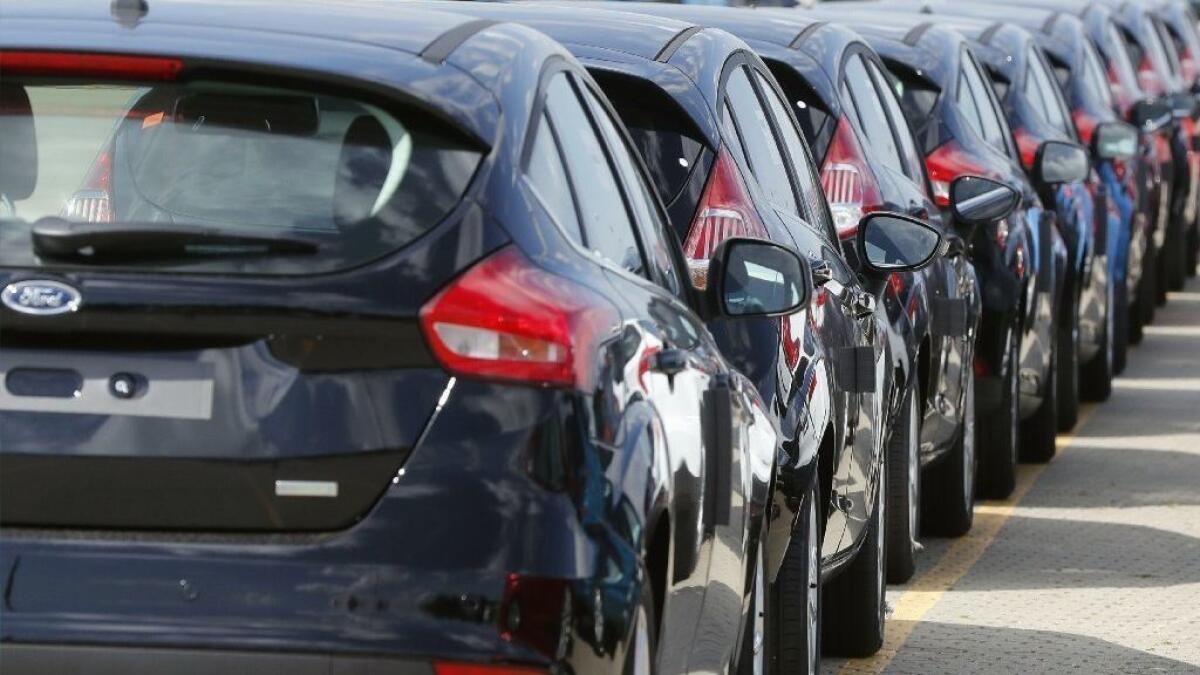Global tussle over auto-import tariffs shifts into higher gear

The outlook for changes in U.S. and European auto tariffs grew murkier Friday.
Faced with President Trump’s threat of higher tariffs on imports of European-made vehicles such as Mercedes-Benz and BMW, a top European Union official floated the idea of dropping tariffs altogether.
The EU would be “willing to bring down even our car tariffs to zero, all tariffs to zero, if the U.S. does the same,” European Trade Commissioner Cecilia Malmstrom told European Parliament lawmakers Thursday.
But Trump promptly said the offer was “not good enough” during an interview with Bloomberg News.
It wasn’t immediately clear what alternative he had in mind, but he said of the Europeans: “Their consumer habits are to buy their cars, not to buy our cars.”
The dispute is part of an overall effort by the Trump administration to massively change U.S. trade policy — partly by a widespread adoption of tariffs, or taxes, on imported goods — because the U.S. ran a trade deficit of $566 billion last year, including a $376-billion deficit with China.
The White House and China already have slapped additional tariffs on a variety of goods they trade, including cars imported from China, and are threatening more. The United States also negotiated a new trade deal with Mexico, one of its two partners in the North American Free Trade Agreement.
The administration also was negotiating a revised NAFTA pact with the other partner, Canada, but those talks appeared to stall Friday.
“We have this giant jigsaw puzzle” of trade pacts under review “and until we get the full picture, it’s impossible to say what the full impact is” on U.S. auto sales, said Michelle Krebs, executive analyst at Autotrader.
“We do know this: If we have a full-blown trade war, we will see [U.S.] vehicle prices go up and sales go way down,” she said. “Everyone is taking this very seriously.”
Indeed, Ford Motor Co. said Friday it canceled plans to import a new crossover model, the Focus Active, from a plant in China because a new 25% U.S. tariff made the vehicle too costly for the American market.
“Our viewpoint on Focus Active was that, given the tariffs, obviously our costs would be substantially higher,” Kumar Galhotra, Ford’s vice president of North American operations, said in a conference call with reporters.
Of the 17.2 million vehicles sold last year in the United States, 52% were built in the United States, and nearly 1 in 4 were manufactured by international firms with U.S. assembly facilities, including European automakers Daimler AG (the parent of Mercedes) and BMW, according to the Center for Automotive Research. The other 48% were imported.
The top two foreign exporters to the U.S. market were Mexico (14%) and Canada (11%), although some of those vehicles were produced by U.S. auto giants such as Ford and General Motors Corp. or had significant U.S.-made content such as engines and transmissions.
In the European situation, it appeared with Malmstrom’s proposal that tariffs between the United States and the EU might be headed lower.
Currently, the United States imposes a 2.5% tariff on cars imported from the European Union and a 25% tariff on imported trucks. The EU, in turn, levies 10% tariffs on imports of U.S.-made cars and trucks.
In looking at the potential effect of lower tariffs with the EU, Mark Wakefield, managing director at the consulting firm AlixPartners, said it helped to view the situation from the viewpoint of a U.S. assembly line worker.
“If you’re making a sedan, without the 10% tariff your product is now more attractive to the European clientele,” he said, but added: “If you’re building a midsize pickup truck, this could be the worst thing you could imagine.”
That’s because imports of pickup trucks made in Europe are subject to the 25% tariff, dubbed the “chicken tax” because it was imposed in the 1960s to retaliate for tariffs imposed by France and Germany on imported chickens.
The 25% tariff applies to bigger sport utility vehicles as well and is a key reason why BMW and Mercedes build their most popular SUVs in the United States.
“Because of the chicken tax, you’d be insane to build a pickup truck or van [in Europe] and ship it to the United States,” which effectively helps protect sales of U.S.-made trucks, Wakefield said.
With no tariffs, he said, pickup trucks might be built and exported to the U.S. market from Eastern Europe at lower prices than U.S.-made pickups because of lower labor costs, he said.
It’s an open question whether dropping the tariffs would help boost overall U.S. exports to Europe.
In addition, the European market is “not that big” for U.S.-made vehicles, said Kristin Dziczek, a vice president of the Center for Automotive Research. Of the 1.98 million U.S.-built vehicles exported last year, 256,000, or 13%, went to the EU, she said.
Lower tariffs mean “pricing will come down” for exports to the EU, “but will it come down far enough to change their preferences?” Ivan Drury, Edmunds’ senior manager of industry analysis, said of the EU market. “Europeans still lean toward smaller hatchbacks, manual transmissions, diesel engines. We’re not making vehicles for that market.”
Bloomberg News contributed to this report.
Twitter: @PeltzLATimes








